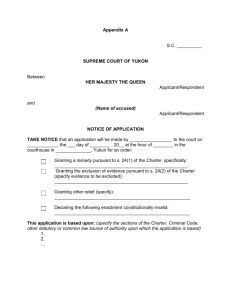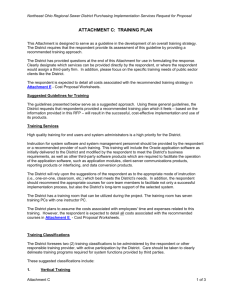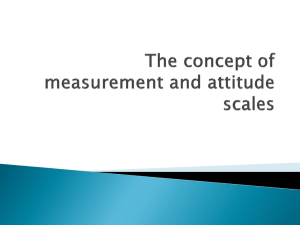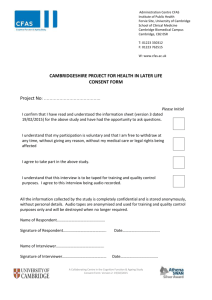elias kheli dlamini & another v the master of high court
advertisement
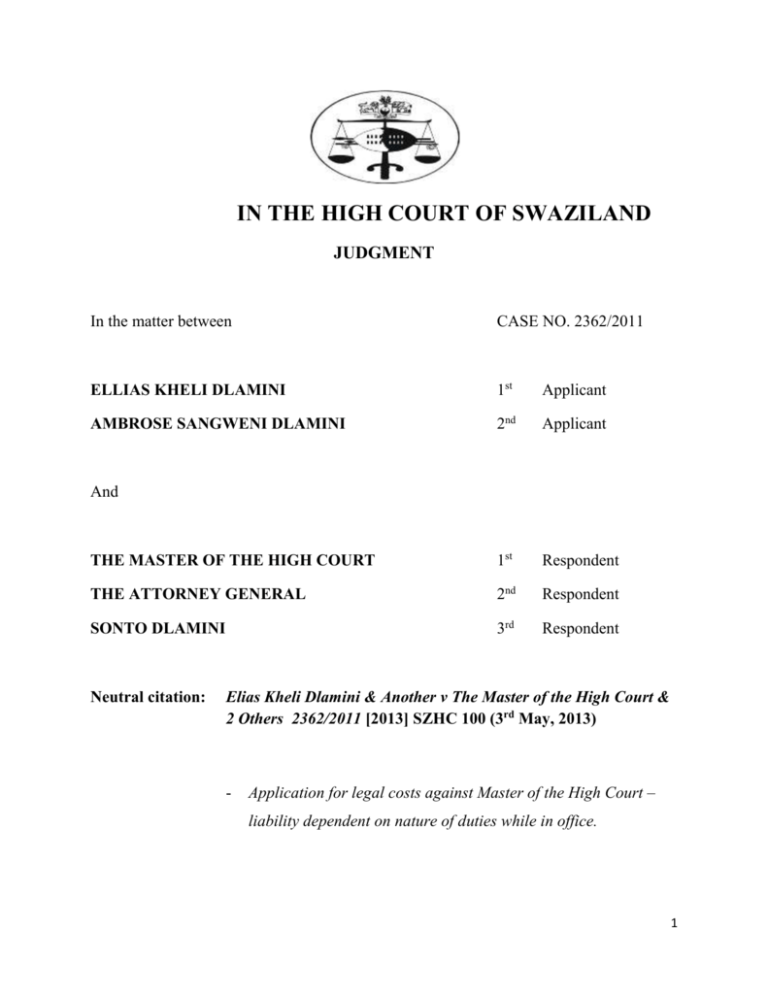
IN THE HIGH COURT OF SWAZILAND JUDGMENT In the matter between CASE NO. 2362/2011 ELLIAS KHELI DLAMINI 1st Applicant AMBROSE SANGWENI DLAMINI 2nd Applicant THE MASTER OF THE HIGH COURT 1st Respondent THE ATTORNEY GENERAL 2nd Respondent SONTO DLAMINI 3rd Respondent And Neutral citation: Elias Kheli Dlamini & Another v The Master of the High Court & 2 Others 2362/2011 [2013] SZHC 100 (3rd May, 2013) - Application for legal costs against Master of the High Court – liability dependent on nature of duties while in office. 1 Summary: The applicant brought an application against the respondents calling for review or setting aside of 1st respondent decision. The 1st respondent had issued a ruling against applicant by ordering that certain herd of cattle called tinsulamnyembeti be awarded to the 3rd respondent. 2nd respondent was cited as the attorney for the 1st respondent. The matter was heard on merits as an unopposed application by all the respondents although respondent filed Notice to Oppose and not an answering affidavit. The court on the basis of no opposition, granted the review. The applicant insisted on costs not against 3rd respondent but 1st respondent. The court postponed the application for costs pending 1st respondent’s appearance. [1] The applicants have through their heads of argument submitted as grounds for costs as follows: “1.6 The application for review was made after the First Respondent had directed that Third Respondent be given seven herd of cattle which are part of tinsulamnyembeti. The Master erred in law in stating that a bride is entitled to such cattle for according to Swazi Law and Custom the cattle being to the mother of the groom and on passing away they are inherited by the last born son and no other. Clearly the Master fell into error and was wrong in this approach. 1.7 The Master further fell into error when he invoked Section 68 (2) of the Administration of Estates Act which provides: ‘The Master may not be called upon to interfere in the administration and distribution of estates of South African. 2 Such estate is dealt with by a Swazi Court having jurisdiction.’ 1.8 In paragraph 11 of the ruling of the Master’s ruling, the Master states: ‘Sonto’s (Third Respondent) prayers that these tinsulamnyembeti be returned complies with the latter option under Section 68. Customarily these (tinsulamnyembeti) are never distributed but are entrusted to the last born sisters in respect of which the bride price were paid.’ 1.9 The above paragraphs are a clear sign that the Master failed not only to grasp Swazi law and apply it, but failed to apply his mind to the facts of the case.” [2] They proceed further to state at paragraphs 2 to 2.5: “2. It is humbly submitted that in order to correct the position which the Master had created it was necessary that Applicants file the application. Furthermore, First Respondent did not oppose the application that the ruling be reviewed and set aside, otherwise an injustice was going to be perpetrated on the other beneficiaries to the estate. 2.1 Applicants contend that they are entitled to the costs on the basis that they were forced by the Master’s decision to file the application for review. [3] The 1st respondent ferociously opposed the application for costs. It was contended on behalf of 1st respondent that when 1st respondent issued the 3 ruling in favour of 3rd respondent, he did so in exercise of his quasi judicial powers conferred to him by the Administration of Estates Act. 1st respondent’s position was analogous to an inferior courts. In the absence of any averment by applicants of mala fide on the part of the 1st respondent, applicants were not entitled to costs. The 1st respondent drew the court’s attention to 1st respondent, showing that 1st respondent exercised his powers judiciously as at the end of the ruling invited those who were dissatisfied with his ruling to approach this court. Further in that regard therefore that 1st respondent could not oppose the application on merits. [4] On behalf of applicant, Mr. B. J. Simelane correctly cited the case of Texas Co. (S.A.) Ltd v Cape Town Municipality 1926 AD 467 at 488 as follows: ‘Costs are awarded to a successful party in order to indemnify him for the expense to which he has been put through having been unjustly compelled either to initiate or defend litigation as the case may be. Owing to the necessary operation of taxation, such award is seldom a complete indemnity, but that does not affect the principle upon which it is based’ [5] However, A. C. Cilliers on Law of Costs, 2008 at page 6 states on the general rule and other rules: 4 “Thirdly, the rule that a judgment on the merits is a prerequisite for a costs order cannot be applied where a full enquiry into the merits is impossible.” [6] I have already indicated that in casu the order in favour of the plaintiff was entered on the basis that the respondents did not oppose applicant’s application. No enquiry was held on the merits per se. Therefore the rule that costs follow the event is as highlighted by authorities a general rule. It is not a hard and fast one. As correctly demonstrated by A. C. Cilliers supra there are exceptions to this rule. [7] The raison d’etre for the above exception is found in Innes C. J. in Kerwin v Jones 1958 (1) S. A. 100 at 401-2 a case I must point out cited was on behalf of applicant which states: “The basis of the general principle that an unsuccessful litigant must pay the costs of his adversary is that the attitude adopted by him has been found to be wrong and that the adoption of his attitude has put the successful adversary to unnecessary expense. Therefore it is just generally speaking to make the unsuccessful litigant pay this expense.” [8] Strict sensu, as the matter was not opposed, the applicants litigated on their own or rather the applicants were the only litigants herein. This position is fortified by the undisputed submission as supported by record that 1st respondent actually invited any party that was dissatisfied with its ruling to approach the High Court. It would be inconceivable for 1st respondent to 5 then oppose the said application which was filed following leave granted by himself to an aggrieved party. [9] In MaClean v Haasbroek, N. O. & Others 1957 (1) S. A. 464 where it was held: “When in an application brought against a public officer, who has acted in a judicial or quasi judicial capacity, no order for costs is sought against him.” [10] It was therefore remise of applicants to seek and insist on an order for costs against 1st respondent. [11] Put differently respondent has been described by applicants in their founding affidavits as: “3. First Respondent is the Master of the High Court cited herein in his official capacity as person in charge of the administration of estates, of Millers Mansion Mbabane in the Hhohho District.” [12] The 1st respondent was therefore exercising its powers in terms of the enabling statute in adjudicating upon the matter. On applicants own showing as he so defines him 1st respondent exercised quasi judicial powers. 6 [13] For this reason alone applicants’ application should fail. [14] One may still approach it from a different angle. [15] The merits of the matter herein relate to the administration of deceased estate. The litigation costs are consequential to the estate. It follows therefore that the rules governing legal costs on such matters should be observed. This principle of our law is applied well in Tregea and Another v Godart and Another 1939 AD 16. Herbstein and Van Winsen, “The Civil Practice of the Supreme Court of South Africa” page 726 writes: “The general rule that should ordinarily follow the event is qualified in legal proceedings instituted in legal proceedings instituted by or against deceased estates. Where the proceedings relate to the construction of a will or to matters pertaining to the administration of an estate, the court may and usually will order the costs of the parties to come out of the estate. (my emphasis) [16] This court is not inclined to order costs against the estate of the deceased. There are no reasonable grounds advanced by applicants to have deceased estate depreciated by an order of costs nor do I find any mero motu. At any rate applicant sought for costs not against 3rd respondent but 1st respondent nor did he cite the estate herein. [17] I need not go to the question as to whether the allegation that the 1st respondent applied the wrong legal principle as it is submitted by applicant is reviewable or not. 7 [18] For the above reasons, I enter the following orders: 1. Applicants’ application is dismissed. 2. Applicants are ordered to pay 1st respondent costs of suit. ____________________________ M. DLAMINI JUDGE For Applicants : For the Respondents: Mr. B. J. Simelane Mr. M. Vilakati 8


